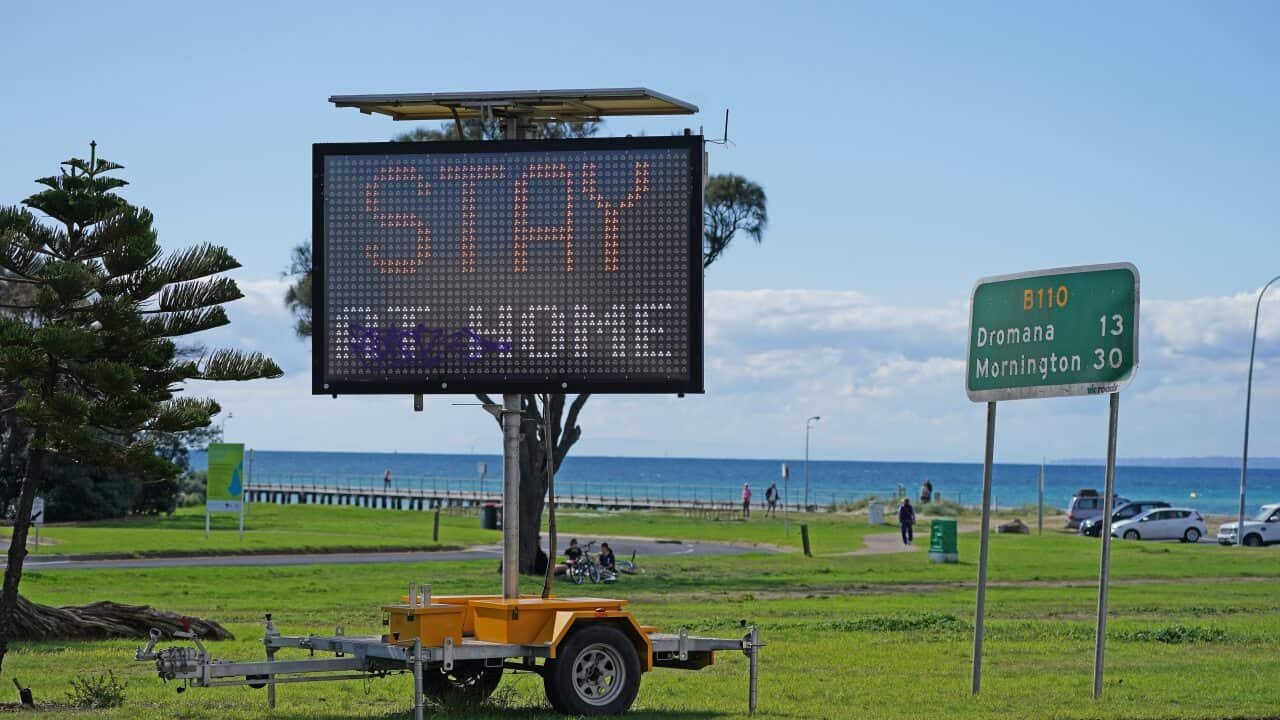聯邦政府過去曾經獲得的數據,顯示全澳有超過64,000黑民,絕大多數是簽證過期居留。
關注組織表示,由於這批黑民未有合法居留身份,所以他們大多數不會尋求醫療保健,有社區人士擔心黑民會引發社區傳播。
來自馬來西亞的穆罕默德(化名)曾經是非法居留的黑民,他接受本台SBS訪問時表示,他非法居留期間,曾經出現嚴重哮喘發作,他當時沒有國民保健(Medicare)看醫生要支付400元,對他來說,是非常困難。
穆罕默德,20幾歲,2013年持旅遊簽證來澳洲,之後非法在農場工作,當時摘水果的人工,低至1.2元一盒。他說當時來澳洲,是聽說可以賺到錢養家。 穆罕默德目前申請庇護,獲得過橋簽證(Bridging Visa E),仍然繼續在維州鄉郊做黑市勞工,工資僅僅夠生活。
穆罕默德目前申請庇護,獲得過橋簽證(Bridging Visa E),仍然繼續在維州鄉郊做黑市勞工,工資僅僅夠生活。

Temporary visa holders face significant financial hardship during the coronavirus crisis. Source: AAP
在2017年,參議院委員會獲得的資料,估計全澳有64,600名過期居留的黑民,其中6,600在澳洲15至20年。
READ MORE

【請注意!】滯澳臨時簽證人士應盡快與移民局聯絡
阿德雷德大學2019年發表的報告顯示,很多農場聘請非法移民,是因為請不到其他工人幫手。報告說:「差劣勞工標準以及剝削工人,成為菜園常見的現象。」
移民律師維瑪是關注移民組織「無證移民團結」(Undocumented Migrants Solidarity)創辦人,她表示,穆罕默德的例子,其實很普遍。
該組織在網上籌款,協助因為新冠疫情而沒有收入的無證移民,目前籌得41,000元。組織又促請政府確保所有移民,不論他們的簽證情況,可以獲得政府的醫療護理。
目前維州、新州及西澳,沒有購買旅遊保險的非澳洲公民,在新冠病毒測試方面,費用豁免。
內政部發言人表示,在澳洲所有人士,不論簽證情況,應該遵守現行衛生指引,出現相關病徵時,應該接受測試。
該發言人又呼籲非法居留人士盡快與內政部接觸,商討他們的情況。
and groceries.
Migration lawyer and founder of advocacy group Undocumented Migrants Solidarity Sanmati Verma said Mohamed’s story was not unique.
“When people think of undocumented as a status … they think of places like the US or Europe with land borders that mean people can enter one place or another without formal papers. Australia’s immigration system operates in such a way that it bestows status and then has various ways of removing it,” Ms Verma said.
It means the vast majority of unlawful migrants in Australia are people who have overstayed their temporary visa, with estimates about the size of this group “at best, extremely vague”, Ms Verma said.
In 2017, a Senate committee heard there were an estimated 64,600 people who had overstayed their visa in Australia. Of these, 6,600 had been in the country for between 15 and 20 years.
But Ms Verma and Monash University Associate Professor Marie Segraves, who published a study investigating the experience of unlawful workers in Australia, believe the number could be significantly higher and potentially growing.
“With the current public health crisis, all sorts of analysis and reporting in the immigration space is suggesting that because of how slow and partial the government’s response has been, the pool of people who are undocumented in Australia and literally marooned here without status … is going to exponentially grow,” Ms Verma said.
“So 100,000 is the baseline from which things can only expand.”
Due to the precarious nature of unlawful work, for which illegal migrants are often underpaid, Dr Segrave said many illegal migrants live in overcrowded accommodation, meaning social distancing is impossible.
“Most of the workers I had contact with who are working in these kinds of conditions with this status, are living with many other people, but also tend to be moving around a lot because they are looking for work opportunities,” she said.
“So those two things are of critical concern in terms of a public health perspective.”
The situation is complicated by the fact that many industries that are suspected of hiring significant numbers of unlawful workers are essential industries.
A , published in 2019, found many Australian farmers were having to choose between hiring unlawful workers or leaving their crops to fail. “Poor labour standards and worker exploitation have become established norms in pockets of the horticulture market,” the report read.
“Farms have become such an open secret actually quite recently,” Ms Verma said, adding that commercial cleaning, delivery, and abattoir industries were also hot spots for unlawful workers.
“All of these nodes of the economy that need to keep moving during the pandemic are critically held together by people who do not have formal visa status or who have formal status that’s about to run out and have nothing further lined up.”
There are also concerns that as industries feel the economic effects of the pandemic, they will become more reliant on unlawful workers who are forced to accept lower wages and poor conditions.
“I think there is the potential for that kind of exploitation to continue, and potentially increase,” Dr Segrave said. “And those workers will be even less incentivised to seek any kind of help because of the lack of other work available.”
Ms Verma’s group has so far raised more than $41,000 via an online fundraiser for an emergency fund to support undocumented migrants who find themselves without income during the pandemic.
The group is also calling for a guarantee that migrants will be able to access medical care regardless of their visa status.
Victoria, New South Wales and Western Australia have temporarily waived the cost of COVID-19 treatment for non-citizens who do not have travel insurance, but advocates say this doesn’t go far enough to combat the fear many feel about coming forward.
“Even within Victoria, the rollout of increased testing requires some careful community-based discussion and advocacy to let people know that when that happens no one is going to be asking about your visa status,” Dr Segrave said, “because we want people coming forward”.
Last week, acting Immigration Minister Alan Tudge told temporary migrants facing the expiration of their visa without a way home to contact immigration officials.
“If there are literally no flights and they are concerned that their visa is coming to an end,” he said, “then they should call the immigration department as a matter of urgency."
A spokesperson for the Department of Home Affairs said: "Everyone in Australia, regardless of their visa status should abide by current health guidelines and seek treatment and testing if they are unwell".
They also urged anyone in Australia unlawfully to come forward and discuss their situation as soon as possible.
*Name has been changed
People in Australia must stay at least 1.5 metres away from others and gatherings are limited to two people unless you are with your family or household.
If you believe you may have contracted the virus, call your doctor (don’t visit) or contact the national Coronavirus Health Information Hotline on 1800 020 080. If you are struggling to breathe or experiencing a medical emergency, call 000.
SBS is committed to informing Australia’s diverse communities about the latest COVID-19 developments. News and information is available in 63 languages at .






